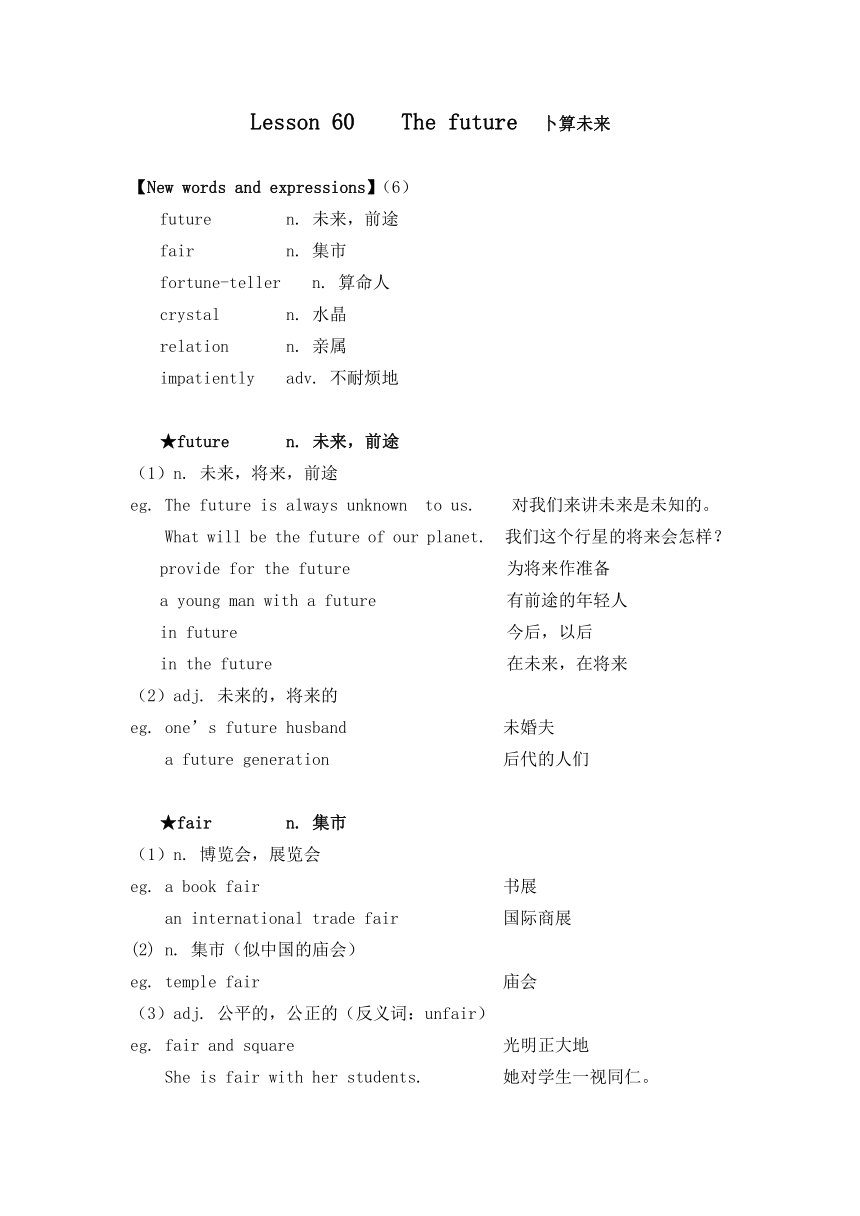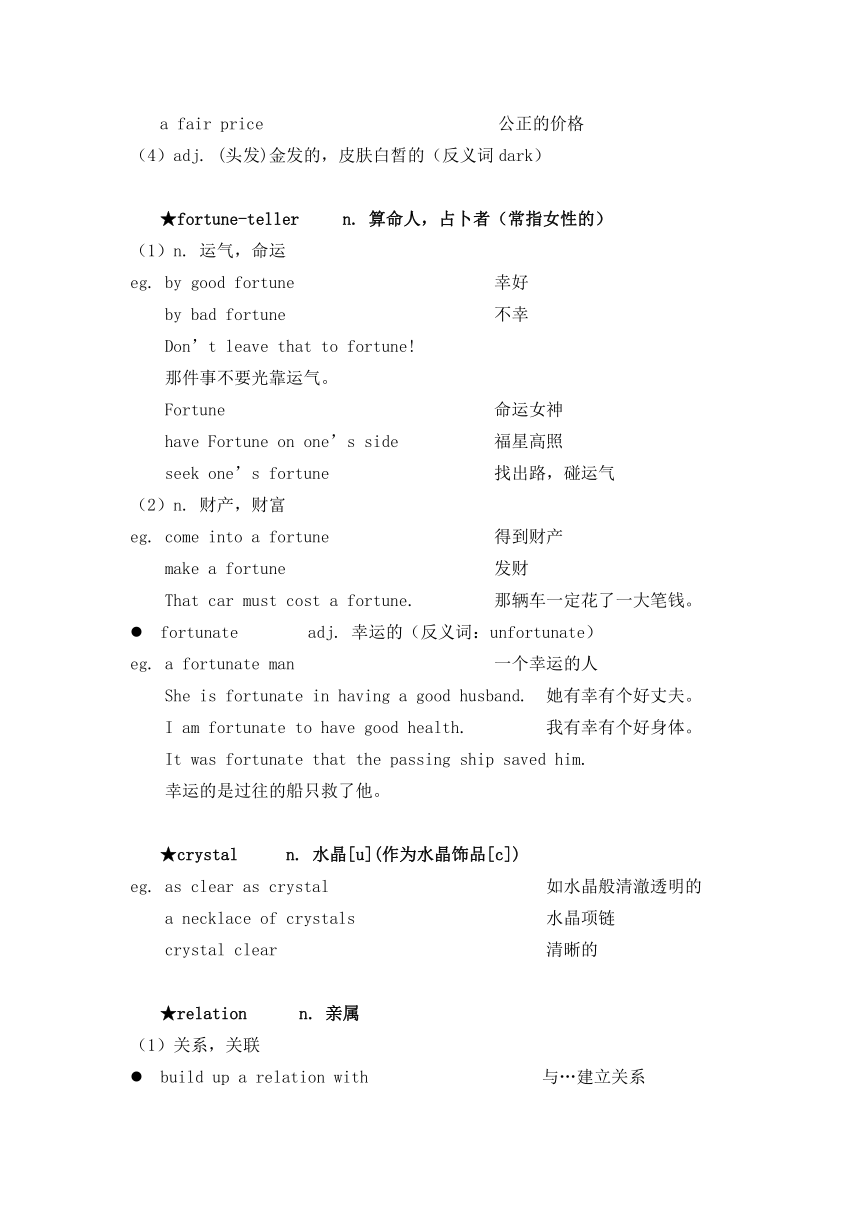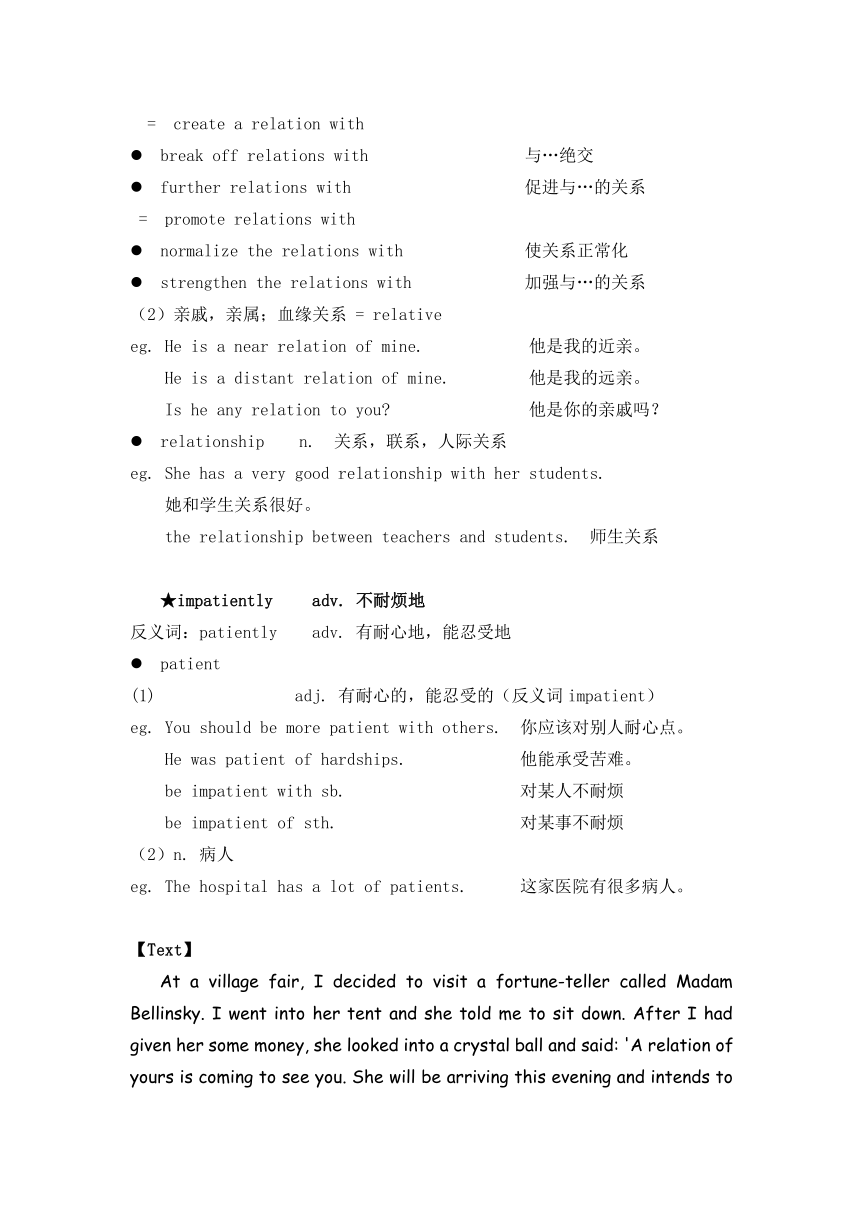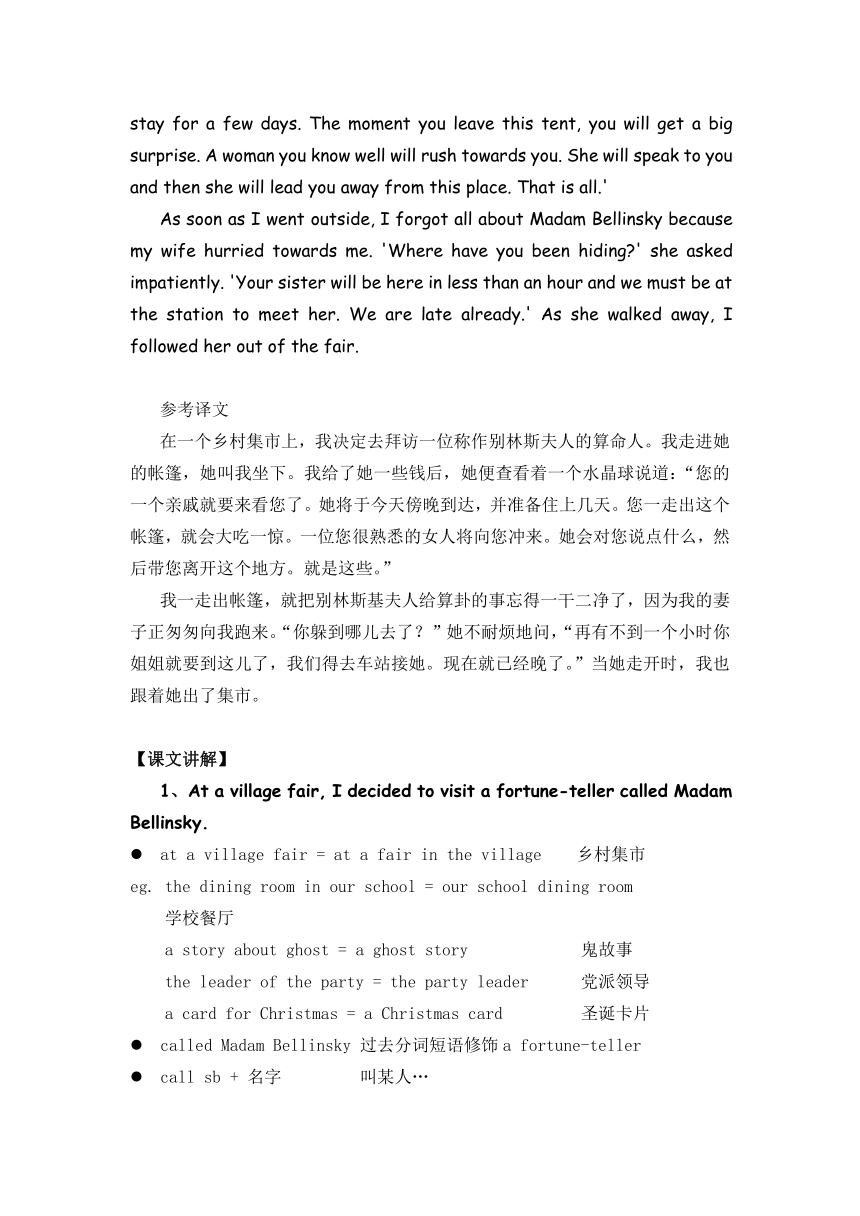新概念英语二册超详教案讲义笔记Lesson 60 The future 卜算未来
文档属性
| 名称 | 新概念英语二册超详教案讲义笔记Lesson 60 The future 卜算未来 |  | |
| 格式 | docx | ||
| 文件大小 | 32.7KB | ||
| 资源类型 | 教案 | ||
| 版本资源 | 新概念英语 | ||
| 科目 | 英语 | ||
| 更新时间 | 2023-09-26 09:09:33 | ||
图片预览




文档简介
Lesson 60 The future 卜算未来
【New words and expressions】(6)
future n. 未来,前途
fair n. 集市
fortune-teller n. 算命人
crystal n. 水晶
relation n. 亲属
impatiently adv. 不耐烦地
★future n. 未来,前途
(1)n. 未来,将来,前途
eg. The future is always unknown to us. 对我们来讲未来是未知的。
What will be the future of our planet. 我们这个行星的将来会怎样?
provide for the future 为将来作准备
a young man with a future 有前途的年轻人
in future 今后,以后
in the future 在未来,在将来
(2)adj. 未来的,将来的
eg. one’s future husband 未婚夫
a future generation 后代的人们
★fair n. 集市
(1)n. 博览会,展览会
eg. a book fair 书展
an international trade fair 国际商展
(2) n. 集市(似中国的庙会)
eg. temple fair 庙会
(3)adj. 公平的,公正的(反义词:unfair)
eg. fair and square 光明正大地
She is fair with her students. 她对学生一视同仁。
a fair price 公正的价格
(4)adj. (头发)金发的,皮肤白皙的(反义词dark)
★fortune-teller n. 算命人,占卜者(常指女性的)
(1)n. 运气,命运
eg. by good fortune 幸好
by bad fortune 不幸
Don’t leave that to fortune!
那件事不要光靠运气。
Fortune 命运女神
have Fortune on one’s side 福星高照
seek one’s fortune 找出路,碰运气
(2)n. 财产,财富
e into a fortune 得到财产
make a fortune 发财
That car must cost a fortune. 那辆车一定花了一大笔钱。
fortunate adj. 幸运的(反义词:unfortunate)
eg. a fortunate man 一个幸运的人
She is fortunate in having a good husband. 她有幸有个好丈夫。
I am fortunate to have good health. 我有幸有个好身体。
It was fortunate that the passing ship saved him.
幸运的是过往的船只救了他。
★crystal n. 水晶[u](作为水晶饰品[c])
eg. as clear as crystal 如水晶般清澈透明的
a necklace of crystals 水晶项链
crystal clear 清晰的
★relation n. 亲属
(1)关系,关联
build up a relation with 与…建立关系
= create a relation with
break off relations with 与…绝交
further relations with 促进与…的关系
= promote relations with
normalize the relations with 使关系正常化
strengthen the relations with 加强与…的关系
(2)亲戚,亲属;血缘关系 = relative
eg. He is a near relation of mine. 他是我的近亲。
He is a distant relation of mine. 他是我的远亲。
Is he any relation to you 他是你的亲戚吗?
relationship n. 关系,联系,人际关系
eg. She has a very good relationship with her students.
她和学生关系很好。
the relationship between teachers and students. 师生关系
★impatiently adv. 不耐烦地
反义词:patiently adv. 有耐心地,能忍受地
patient
adj. 有耐心的,能忍受的(反义词impatient)
eg. You should be more patient with others. 你应该对别人耐心点。
He was patient of hardships. 他能承受苦难。
be impatient with sb. 对某人不耐烦
be impatient of sth. 对某事不耐烦
(2)n. 病人
eg. The hospital has a lot of patients. 这家医院有很多病人。
【Text】
At a village fair, I decided to visit a fortune-teller called Madam Bellinsky. I went into her tent and she told me to sit down. After I had given her some money, she looked into a crystal ball and said: 'A relation of yours is coming to see you. She will be arriving this evening and intends to stay for a few days. The moment you leave this tent, you will get a big surprise. A woman you know well will rush towards you. She will speak to you and then she will lead you away from this place. That is all.'
As soon as I went outside, I forgot all about Madam Bellinsky because my wife hurried towards me. 'Where have you been hiding ' she asked impatiently. 'Your sister will be here in less than an hour and we must be at the station to meet her. We are late already.' As she walked away, I followed her out of the fair.
参考译文
在一个乡村集市上,我决定去拜访一位称作别林斯夫人的算命人。我走进她的帐篷,她叫我坐下。我给了她一些钱后,她便查看着一个水晶球说道:“您的一个亲戚就要来看您了。她将于今天傍晚到达,并准备住上几天。您一走出这个帐篷,就会大吃一惊。一位您很熟悉的女人将向您冲来。她会对您说点什么,然后带您离开这个地方。就是这些。”
我一走出帐篷,就把别林斯基夫人给算卦的事忘得一干二净了,因为我的妻子正匆匆向我跑来。“你躲到哪儿去了?”她不耐烦地问,“再有不到一个小时你姐姐就要到这儿了,我们得去车站接她。现在就已经晚了。”当她走开时,我也跟着她出了集市。
【课文讲解】
1、At a village fair, I decided to visit a fortune-teller called Madam Bellinsky.
at a village fair = at a fair in the village 乡村集市
eg. the dining room in our school = our school dining room
学校餐厅
a story about ghost = a ghost story 鬼故事
the leader of the party = the party leader 党派领导
a card for Christmas = a Christmas card 圣诞卡片
called Madam Bellinsky 过去分词短语修饰a fortune-teller
call sb + 名字 叫某人…
2、I went into her tent and she told me to sit down. After I had given her some money, she looked into a crystal ball and said: 'A relation of yours is coming to see you.
give her some money = give some money to her (双宾语)
look into
注视…的内部
eg. look into a room 往房间里看
调查,检查
eg. The committee is looking into the cause of the accident.
委员会在调查事故的原因。
look onto (房屋等)面向,濒临
look in 向内探视,顺路拜访
eg. look in a cupboard 看一看碗柜里面
I’ll look in on you tomorrow. 我明天去拜访你。
a relation of yours 您的一个亲戚(双重所有格)
= one of your relations
句中的现在进行时is coming to see you并不表示目前正在进行的动作,而表示将要发生的事情。
用进行时表达将来时的含义,常用动词:go, come, leave, arrive, land, meet, die, start…
3、She will be arriving this evening and intends to stay for a few days.
will be arriving 进行时表将来时的含义
intend to do 打算做…(现在时表将来时用法)
4、The moment you leave this tent, you will get a big surprise.
the moment (conj.)= as soon as 一……就……(主将从现)
(在这个连词引导的时间状语从句中要用一般现在时来表示将来时)
get a surprise 大吃一惊
get a shock 大为震惊
get a fright 吓了一跳
to one’s surprise 令某人吃惊的是
to one’s joy 令某人高兴的是
to one’s disappointment 令某人失望的是
5、A woman you know well will rush towards you. She will speak to you and then she will lead you away from this place.
you know well是个定语从句修饰woman
speak
v. 说,讲,谈话
eg. speak English 讲英语
speak the truth = tell the truth 讲实话
speak to sb. 对某人说话
speak for oneself 为自己辩护
speak ill of sb. 说人坏话
speak well of sb. 说人好话
(2)v. 发表演讲
eg. Who will speak at the opening 谁将致开幕词?
6、That is all.
在口语中表示“完了,就这些,事情就是这样”。
eg. He borrowed some money from me. That’s all.
他向我借了些钱,仅此而已。
7、As soon as I went outside, I forgot all about Madam Bellinsky because my wife hurried towards me.
forget all about 忘得一干二净
forget it 算了
forget(vt.) 忘记(反义词:remember)
eg. I’ve forgotten his telephone number. 我忘了他的电话号码。
forget doing
eg. I’ll never forget seeing the musical in NY.
我不会忘记在纽约看的音乐剧。
forget to do
eg. Don’t forget to call me. 别忘了给我打电话。
forget that
eg. I was forgetting that you don’t like apples.
这句话中的all是代词,表示“一切,全部,所有的事”,它作主语时被视为单数:
eg. All I can remember is her name.
hurry towards sb. 向某人匆匆赶去
eg. He hurried home. 他匆忙赶到家。
We hurried to school. 我们匆忙赶回学校。
Don’t hurry. 别急。
With this, the woman hurried away. 说完这,那个妇人匆匆离去了。
= With this, the woman hurried off.
in a hurry(n.) 匆匆忙忙的
8、'Where have you been hiding ' she asked impatiently. 'Your sister will be here in less than an hour and we must be at the station to meet her. We are late already.'
have been hiding是个现在完成进行时表达了一种不耐烦的情绪
must be表示用现在时态指将来的状况,这句话也可变成:
We must go to the station to meet her.
9、As she walked away, I followed her out of the fair.
away adv. 向一边
walk away 走开
hurry away 匆匆离开
look away 四处张望
take away 拿走
move away 离开
go away 走开
follow sb. out of 跟着某人走出
反:follow sb. into 跟着某人进入
【Key structures】
表示将要发生的事情
将来时:
be going to + 动词原形
eg. I am going to travel by air. 我打算坐飞机旅行。
Ann is ill. I am going to visit her.
will + 动词原形
eg. You will enjoy yourself if you travel by sea.
be + v.-ing 表示为将来安排好的活动和事件。
eg. He is arriving tomorrow. 他明天到达。
be about to 表即将发生的行为、动作。
eg. He was about to leave when the telephone rang.
他正要走的时候,电话铃响了。
plan to/ intend to
可换用,但前者常用于进行时,而intend只用于简单时态
eg. Do you still intend to go 你还打算走吗?
We were planning to go last year but we hadn’t enough money.
我们本打算去年走的,但没有足够的钱。
be due to do 表示早已安排好的事,即“定于”
eg. The train is due to arrive at 6:00 o’clock.
火车定于6点钟到达。
在真实条件句的if从句中和时间连接词引导的从句中,只能用一般现在时的形式来表达一般将来时的意思,时态要求为“主将从现”,时间连接词为until, as soon as, after, before, when, as, the moment, the instant, the minute…
eg. If it rains tomorrow we shall stay at home.
假如明天下雨,我们将呆在家里。
The moment he arrives, I shall let you know.
他一到这儿,我就会让你知道。
I shall wait here until he comes. 我会等到他来。
As soon as the rain stops, we shall go out.
雨一停,我们就出去。
You must finish your dinner before you leave the table.
你离开饭桌之前必须把饭吃完了。
【Special Difficulties】
由名词+名词构成的复合名词
第一个名词通常起形容词(或修饰语)的作用,而且一般都用单数。这类复合名词可以代替of结构,如a car key(汽车钥匙),a chair leg(椅子腿);也可以理解为第一个名词指地点,第二个词指该地点中的东西,如a village pub(乡村酒吧),a world record(世界纪录),a kitchen sink(厨房洗涤槽);也可以表示时间,如a Christams card(圣诞卡),an evening dress(晚礼服),afternoon tea(下午茶);也可以表示分类,如a horror film(恐怖电影),a flower shop(花店),a taxi-driver(出租车司机);也可以表示材料,如a fur coat(裘皮大衣),a gold watch(金表),cigarette ends(香烟头)。
【New words and expressions】(6)
future n. 未来,前途
fair n. 集市
fortune-teller n. 算命人
crystal n. 水晶
relation n. 亲属
impatiently adv. 不耐烦地
★future n. 未来,前途
(1)n. 未来,将来,前途
eg. The future is always unknown to us. 对我们来讲未来是未知的。
What will be the future of our planet. 我们这个行星的将来会怎样?
provide for the future 为将来作准备
a young man with a future 有前途的年轻人
in future 今后,以后
in the future 在未来,在将来
(2)adj. 未来的,将来的
eg. one’s future husband 未婚夫
a future generation 后代的人们
★fair n. 集市
(1)n. 博览会,展览会
eg. a book fair 书展
an international trade fair 国际商展
(2) n. 集市(似中国的庙会)
eg. temple fair 庙会
(3)adj. 公平的,公正的(反义词:unfair)
eg. fair and square 光明正大地
She is fair with her students. 她对学生一视同仁。
a fair price 公正的价格
(4)adj. (头发)金发的,皮肤白皙的(反义词dark)
★fortune-teller n. 算命人,占卜者(常指女性的)
(1)n. 运气,命运
eg. by good fortune 幸好
by bad fortune 不幸
Don’t leave that to fortune!
那件事不要光靠运气。
Fortune 命运女神
have Fortune on one’s side 福星高照
seek one’s fortune 找出路,碰运气
(2)n. 财产,财富
e into a fortune 得到财产
make a fortune 发财
That car must cost a fortune. 那辆车一定花了一大笔钱。
fortunate adj. 幸运的(反义词:unfortunate)
eg. a fortunate man 一个幸运的人
She is fortunate in having a good husband. 她有幸有个好丈夫。
I am fortunate to have good health. 我有幸有个好身体。
It was fortunate that the passing ship saved him.
幸运的是过往的船只救了他。
★crystal n. 水晶[u](作为水晶饰品[c])
eg. as clear as crystal 如水晶般清澈透明的
a necklace of crystals 水晶项链
crystal clear 清晰的
★relation n. 亲属
(1)关系,关联
build up a relation with 与…建立关系
= create a relation with
break off relations with 与…绝交
further relations with 促进与…的关系
= promote relations with
normalize the relations with 使关系正常化
strengthen the relations with 加强与…的关系
(2)亲戚,亲属;血缘关系 = relative
eg. He is a near relation of mine. 他是我的近亲。
He is a distant relation of mine. 他是我的远亲。
Is he any relation to you 他是你的亲戚吗?
relationship n. 关系,联系,人际关系
eg. She has a very good relationship with her students.
她和学生关系很好。
the relationship between teachers and students. 师生关系
★impatiently adv. 不耐烦地
反义词:patiently adv. 有耐心地,能忍受地
patient
adj. 有耐心的,能忍受的(反义词impatient)
eg. You should be more patient with others. 你应该对别人耐心点。
He was patient of hardships. 他能承受苦难。
be impatient with sb. 对某人不耐烦
be impatient of sth. 对某事不耐烦
(2)n. 病人
eg. The hospital has a lot of patients. 这家医院有很多病人。
【Text】
At a village fair, I decided to visit a fortune-teller called Madam Bellinsky. I went into her tent and she told me to sit down. After I had given her some money, she looked into a crystal ball and said: 'A relation of yours is coming to see you. She will be arriving this evening and intends to stay for a few days. The moment you leave this tent, you will get a big surprise. A woman you know well will rush towards you. She will speak to you and then she will lead you away from this place. That is all.'
As soon as I went outside, I forgot all about Madam Bellinsky because my wife hurried towards me. 'Where have you been hiding ' she asked impatiently. 'Your sister will be here in less than an hour and we must be at the station to meet her. We are late already.' As she walked away, I followed her out of the fair.
参考译文
在一个乡村集市上,我决定去拜访一位称作别林斯夫人的算命人。我走进她的帐篷,她叫我坐下。我给了她一些钱后,她便查看着一个水晶球说道:“您的一个亲戚就要来看您了。她将于今天傍晚到达,并准备住上几天。您一走出这个帐篷,就会大吃一惊。一位您很熟悉的女人将向您冲来。她会对您说点什么,然后带您离开这个地方。就是这些。”
我一走出帐篷,就把别林斯基夫人给算卦的事忘得一干二净了,因为我的妻子正匆匆向我跑来。“你躲到哪儿去了?”她不耐烦地问,“再有不到一个小时你姐姐就要到这儿了,我们得去车站接她。现在就已经晚了。”当她走开时,我也跟着她出了集市。
【课文讲解】
1、At a village fair, I decided to visit a fortune-teller called Madam Bellinsky.
at a village fair = at a fair in the village 乡村集市
eg. the dining room in our school = our school dining room
学校餐厅
a story about ghost = a ghost story 鬼故事
the leader of the party = the party leader 党派领导
a card for Christmas = a Christmas card 圣诞卡片
called Madam Bellinsky 过去分词短语修饰a fortune-teller
call sb + 名字 叫某人…
2、I went into her tent and she told me to sit down. After I had given her some money, she looked into a crystal ball and said: 'A relation of yours is coming to see you.
give her some money = give some money to her (双宾语)
look into
注视…的内部
eg. look into a room 往房间里看
调查,检查
eg. The committee is looking into the cause of the accident.
委员会在调查事故的原因。
look onto (房屋等)面向,濒临
look in 向内探视,顺路拜访
eg. look in a cupboard 看一看碗柜里面
I’ll look in on you tomorrow. 我明天去拜访你。
a relation of yours 您的一个亲戚(双重所有格)
= one of your relations
句中的现在进行时is coming to see you并不表示目前正在进行的动作,而表示将要发生的事情。
用进行时表达将来时的含义,常用动词:go, come, leave, arrive, land, meet, die, start…
3、She will be arriving this evening and intends to stay for a few days.
will be arriving 进行时表将来时的含义
intend to do 打算做…(现在时表将来时用法)
4、The moment you leave this tent, you will get a big surprise.
the moment (conj.)= as soon as 一……就……(主将从现)
(在这个连词引导的时间状语从句中要用一般现在时来表示将来时)
get a surprise 大吃一惊
get a shock 大为震惊
get a fright 吓了一跳
to one’s surprise 令某人吃惊的是
to one’s joy 令某人高兴的是
to one’s disappointment 令某人失望的是
5、A woman you know well will rush towards you. She will speak to you and then she will lead you away from this place.
you know well是个定语从句修饰woman
speak
v. 说,讲,谈话
eg. speak English 讲英语
speak the truth = tell the truth 讲实话
speak to sb. 对某人说话
speak for oneself 为自己辩护
speak ill of sb. 说人坏话
speak well of sb. 说人好话
(2)v. 发表演讲
eg. Who will speak at the opening 谁将致开幕词?
6、That is all.
在口语中表示“完了,就这些,事情就是这样”。
eg. He borrowed some money from me. That’s all.
他向我借了些钱,仅此而已。
7、As soon as I went outside, I forgot all about Madam Bellinsky because my wife hurried towards me.
forget all about 忘得一干二净
forget it 算了
forget(vt.) 忘记(反义词:remember)
eg. I’ve forgotten his telephone number. 我忘了他的电话号码。
forget doing
eg. I’ll never forget seeing the musical in NY.
我不会忘记在纽约看的音乐剧。
forget to do
eg. Don’t forget to call me. 别忘了给我打电话。
forget that
eg. I was forgetting that you don’t like apples.
这句话中的all是代词,表示“一切,全部,所有的事”,它作主语时被视为单数:
eg. All I can remember is her name.
hurry towards sb. 向某人匆匆赶去
eg. He hurried home. 他匆忙赶到家。
We hurried to school. 我们匆忙赶回学校。
Don’t hurry. 别急。
With this, the woman hurried away. 说完这,那个妇人匆匆离去了。
= With this, the woman hurried off.
in a hurry(n.) 匆匆忙忙的
8、'Where have you been hiding ' she asked impatiently. 'Your sister will be here in less than an hour and we must be at the station to meet her. We are late already.'
have been hiding是个现在完成进行时表达了一种不耐烦的情绪
must be表示用现在时态指将来的状况,这句话也可变成:
We must go to the station to meet her.
9、As she walked away, I followed her out of the fair.
away adv. 向一边
walk away 走开
hurry away 匆匆离开
look away 四处张望
take away 拿走
move away 离开
go away 走开
follow sb. out of 跟着某人走出
反:follow sb. into 跟着某人进入
【Key structures】
表示将要发生的事情
将来时:
be going to + 动词原形
eg. I am going to travel by air. 我打算坐飞机旅行。
Ann is ill. I am going to visit her.
will + 动词原形
eg. You will enjoy yourself if you travel by sea.
be + v.-ing 表示为将来安排好的活动和事件。
eg. He is arriving tomorrow. 他明天到达。
be about to 表即将发生的行为、动作。
eg. He was about to leave when the telephone rang.
他正要走的时候,电话铃响了。
plan to/ intend to
可换用,但前者常用于进行时,而intend只用于简单时态
eg. Do you still intend to go 你还打算走吗?
We were planning to go last year but we hadn’t enough money.
我们本打算去年走的,但没有足够的钱。
be due to do 表示早已安排好的事,即“定于”
eg. The train is due to arrive at 6:00 o’clock.
火车定于6点钟到达。
在真实条件句的if从句中和时间连接词引导的从句中,只能用一般现在时的形式来表达一般将来时的意思,时态要求为“主将从现”,时间连接词为until, as soon as, after, before, when, as, the moment, the instant, the minute…
eg. If it rains tomorrow we shall stay at home.
假如明天下雨,我们将呆在家里。
The moment he arrives, I shall let you know.
他一到这儿,我就会让你知道。
I shall wait here until he comes. 我会等到他来。
As soon as the rain stops, we shall go out.
雨一停,我们就出去。
You must finish your dinner before you leave the table.
你离开饭桌之前必须把饭吃完了。
【Special Difficulties】
由名词+名词构成的复合名词
第一个名词通常起形容词(或修饰语)的作用,而且一般都用单数。这类复合名词可以代替of结构,如a car key(汽车钥匙),a chair leg(椅子腿);也可以理解为第一个名词指地点,第二个词指该地点中的东西,如a village pub(乡村酒吧),a world record(世界纪录),a kitchen sink(厨房洗涤槽);也可以表示时间,如a Christams card(圣诞卡),an evening dress(晚礼服),afternoon tea(下午茶);也可以表示分类,如a horror film(恐怖电影),a flower shop(花店),a taxi-driver(出租车司机);也可以表示材料,如a fur coat(裘皮大衣),a gold watch(金表),cigarette ends(香烟头)。
同课章节目录
